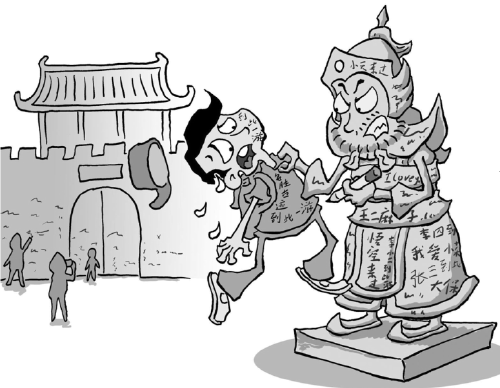Educate tourists to prevent vandalism
Updated: 2016-09-29 07:48
By Liu Simin(China Daily)
|
|||||||||
 |
|
HAO YANPENG/CHINA DAILY |
The weeklong National Day holiday is around the corner, and the expected tourism boom may also see some people vandalizing tourist sites and antiques.
Chen Zhicheng is the latest addition to the vandal list. After netizens condemned him for writing his name and poem in red paint on the cliff of a mountain in Beijing's Fangshan district, he was forced to erase them. Though he could be banned from visiting certain tourist sites, he is not the only one of his kind and unfortunately may not be the last.
In May 2013, Ding Jinhao, a middle school student from East China's Jiangsu province, carved his name on a sculpture in Luxor Temple in Egypt. And in September last year, a couple carved their names on the antique water tank in the Palace Museum. Ding apologized for his act, but the couple could not be identified and went unpunished.
Some experts suggest graffiti boards be put up at scenic spots, so that those who want to can write their names to feel a sense of fulfillment. Not a bad idea. But will they prevent vandalism?
Officials at Bamboo Sea, a scenic spot in Southwest China's Sichuan province, had found a way to stop people from carving their names on bamboos and trees. In August last year, they earmarked a special area for visitors to carve their names on bamboos. As a result, tourists stopped writing their names on bamboos and trees in the rest of the scenic spot.
Yet in the Mutianyu section of the Great Wall in Beijing, the graffiti walls didn't stop people from carving their names in other places. That's because some people want to write their names in spots where others can't reach to feel superior to the rest. It is this distorted mentality that prompts some to write their names on precious objects and in tourist sites.
Therefore, special graffiti walls alone cannot solve the problem. It has to be accompanied by stricter protection laws and equally strict enforcement.
The current penalty for vandalizing a tourist spot or antique is rather light. The harshest punishment is perhaps being blacklisted as a tourist. For example, the current criminal law says that only those "damaging antiques maliciously" face criminal charges, while holding those who "inadvertently" cause damage innocent. And suspects always say, "I did not notice", to escape punishment.
Experts have long been calling for the deletion of "maliciously" from the clause, and we hope legislators would listen to their plea. While that may help, it is also necessary to educate people about the importance of scenic and historical sites, and antiques to help them change their mindset. Some people carve their names in tourist spots to let others know they had "been there and done that". So tourism officials across the country should explain to visitors why it is vitally important to respect the sanctity of the sites they visit. The visit to a place can be turned into an education tour in civil behavior.
Most tourists behave well; only a few have given Chinese tourists a bad name. This type of tourists should be identified and warned to preempt vandalism, a job that can be accomplished only with the help of tour guides and agencies.
The author is vice-president of tourism under the Chinese Society for Future Studies. This is an excerpt from his interview with China Daily's Zhang Zhouxiang.
Related Stories
Tourists visit Baotu Spring in Jinan 2016-09-28 15:33
Washington lures China tourists 2016-09-28 11:22
China's outbound tourists to exceed 600m in five years 2016-09-28 10:04
Mainland tourists shunning Taiwan 2016-09-28 08:00
Today's Top News
MH17 missile came from Russia:Investigation
Sheffield research to help China's space plan
Royal couple continue their charmed tour in Canada
Russia unveils Syria truce deal with US
Poll suggests Clinton winner of 1st presidential debate
Top official: China goes beyond its own interests
Russian ice creams hot in China
Renminbi use surges in London in spite of Brexit
Hot Topics
Lunar probe , China growth forecasts, Emission rules get tougher, China seen through 'colored lens', International board,
Editor's Picks

|

|

|

|

|

|







